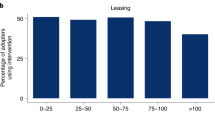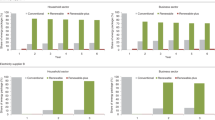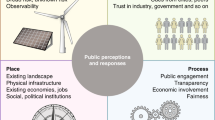Abstract
Rooftop solar panels could ease energy vulnerability concerns among households, particularly in the face of rising bills. However, few studies have explored the lived experiences of people with this technology. Here, I present findings from a ten-month study that followed seven households from a low-income community, who were given the opportunity to undertake prosuming—producing and consuming—of solar energy. Drawing on social practice theory and time geography, prosuming is analysed as a domestic project that has the potential to become embedded in everyday life by evolving across three temporal stages: adopting, establishing and committing. At the outset, not all households were convinced of the benefits of solar power; some even initially turned down the free panels as they were associated with ‘posh’ homeowners not social-housing tenants. However, as solar entitlement increased, prosuming offered an opportunity to decrease household energy costs, although these reductions cannot be assumed. This study offers valuable insights into topical debates, including the role of microgeneration in reducing energy vulnerability.
This is a preview of subscription content, access via your institution
Access options
Access Nature and 54 other Nature Portfolio journals
Get Nature+, our best-value online-access subscription
$29.99 / 30 days
cancel any time
Subscribe to this journal
Receive 12 digital issues and online access to articles
$119.00 per year
only $9.92 per issue
Buy this article
- Purchase on Springer Link
- Instant access to full article PDF
Prices may be subject to local taxes which are calculated during checkout
Similar content being viewed by others
Data availability
The data are not publicly available as they contains information that could compromise research participants’ privacy and consents.
References
Ekins, P. & Watson, J. UK Energy in a Global Context: Synthesis Report (UKER, 2014); http://sro.sussex.ac.uk/48756/1/UK%20Energy%20in%20a%20Global%20Context.pdf
The Resilience of the Electricity System (House of Lords, 2015); https://publications.parliament.uk/pa/ld201415/ldselect/ldsctech/121/121.pdf
Delivering UK Energy Investment (DECC, 2014); https://www.gov.uk/government/uploads/system/uploads/attachment_data/file/331071/DECC_Energy_Investment_Report.pdf
Charities Warn £3,000 Energy Bill Could Leave 8.5 Million UK Households in Fuel Poverty (NEA, 2022); https://www.nea.org.uk/news/charities-warn-3000-energy-bill-could-leave-8-5-million-uk-households-in-fuel-poverty/
Middlemiss, L. & Gillard, R. Fuel poverty from the bottom-up: characterising household energy vulnerability through the lived experience of the fuel poor. Energy Res. Soc. Sci. 6, 146–154 (2015).
Reid, L., McKee, K. & Crawford, J. Exploring the stigmatization of energy efficiency in the UK: an emerging research agenda. Energy Res. Soc. Sci. 10, 141–149 (2015).
Bahaj, A. S. & James, P. A. B. Urban energy generation: the added value of photovoltaics in social housing. Renew. Sustain. Energy Rev. 11, 2121–2136 (2007).
O’Flaherty, F. J. & Pinder, J. The Role of Micro-Generation Technologies in Alleviating Fuel Poverty: Final Report to the Eaga Charitable Trust (Sheffield Hallam Univ, 2011).
Saunders, R. W., Gross, R. J. K. & Wade, J. Can premium tariffs for micro-generation and small scale renewable heat help the fuel poor, and if so, how? Case studies of innovative finance for community energy schemes in the UK. Energy Policy 42, 78–88 (2012).
Walker, G. Decentralised systems and fuel poverty: are there any links or risks? Energy Policy 36, 4514–4517 (2008).
Ares, E., White, E., Danby, G. & Hough, D. Energy Policy Overview (House of Commons, 2016).
Bulkeley, H. et al. Customer–Led Network Revolution: Durham University Social Science Research March 2014 Report (Network Revolution, 2014); http://www.networkrevolution.co.uk/wp-content/uploads/2014/05/CLNR-L052_Social_Science_Report_March_2014.pdf
Using Solar PV to Tackle Fuel Poverty (Changeworks Eaga Charitable Trust, 2014); http://www.changeworks.org.uk/sites/default/files/Using_Solar_PV_to_Tackle_Fuel_Poverty.pdf
Vaughan, A. UK solar power installations plummet after government cuts. The Guardian (8 April, 2016); http://www.theguardian.com/environment/2016/apr/08/solar-installation-in-british-homes-falls-by-three-quarters-after-subsidy-cuts
Powells, G., Bulkeley, H., Bell, S. & Judson, E. Peak electricity demand and the flexibility of everyday life. Geoforum 55, 43–52 (2014).
Frankel, D. & Wagner, A. Battery Storage: The Next Disruptive Technology in the Power Sector (McKinsey & Company, 2017); file:///Users/nicoletteallen/Downloads/battery-storage-the-next-disruptive-technology-in-the-power-sector.pdf
Is Home Energy Storage Right for Me? (Energy Saving Trust, 22 November 2019); https://energysavingtrust.org.uk/home-energy-storage-right-me/
Ellsworth-Krebs, K. & Reid, L. Conceptualising energy prosumption: exploring energy production, consumption and microgeneration in Scotland, UK. Environ. Plan A. 48, 1988–2005 (2016).
Olkkonen, L., Korjonen-Kuusipuro, K. & Grönberg, I. Redefining a stakeholder relation: Finnish energy “prosumers” as co-producers. Environ. Innov. Soc. Transit. 24, 57–66 (2017).http://www.sciencedirect.com/science/article/pii/S2210422416301022
Toffler, A. The Third Wave (Pan Books, 1980).
Keirstead, J. Behavioural responses to photovoltaic systems in the UK domestic sector. Energy Policy 35, 4128–4141 (2007).
Abi-Ghanem, D. & Haggett, C. in Renewable Energy and the Public: From NIMBY to Participation (ed. Devine-Wright, P.) 149–166 (Routledge, 2011).
Baborska-Narozny, M., Stevenson, F. & Ziyad, F. J. User learning and emerging practices in relation to innovative technologies: a case study of domestic photovoltaic systems in the UK. Energy Res. Soc. Sci. 13, 24–37 (2016).
Bulkeley, H., Powells, G. & Bell, S. Smart grids and the constitution of solar electricity conduct. Environ. Plan A 48, 7–23 (2016).
English Indices of Deprivation (DCLG, 2015); https://www.gov.uk/government/statistics/english-indices-of-deprivation-2015
Guest, G. How many interviews are enough?: an experiment with data saturation and variability. Field Methods 18, 59–82 (2006).
Kuzel, A. J. in Doing Qualitative Research 2nd edn (eds Crabtree, B. F. & Miller, W. L.) 31–44 (Sage, 1999).
Cooper, N. Below the Breadline: The Relentless Rise of Food Poverty in Britain (Church Action on Poverty Oxfam GB Trussell Trust, 2014).
Hargreaves, T., Nye, M. & Burgess, J. Making energy visible: a qualitative field study of how householders interact with feedback from smart energy monitors. Energy Policy 38, 6111–6119 (2010).
Fontana, A. & Frey, J. in Handbook of Qualitative Research (eds Denzin, N. K. & Lincoln, Y. S.) 361–376 (Sage, 1994).
Legard, R., Keegan, J. & Ward, K. in Qualitative Research Practice: A Guide for Social Science Students and Researchers (eds Ritchie, J. & Lewis, J.) 138–169 (Sage, 2003).
Sovacool, B. K. & Hess, D. J. Ordering theories: typologies and conceptual frameworks for sociotechnical change. Soc. Stud. Sci. 47, 703–750 (2017).
Shove, E. Beyond the ABC: climate change policy and theories of social change. Environ. Plan Econ. Space 42, 1273–1285 (2010).
Schatzki, T. R. The Site of the Social: A Philosophical Account of the Constitution of Social Life and Change (Penn State Press, 2002).
Reckwitz, A. Toward a theory of social practices: a development in culturalist theorizing. Eur. J. Soc. Theory 5, 243–263 (2002).
Shove, E., Watson, M., Spurling, N. & Skillington, T. Conceptualizing connections: energy demand, infrastructures and social practices. Eur. J. Soc. Theory 18, 274–287 (2015).
Hagerstrand, T. Diorama, path and project. Tijdschr. Voor Econ. En. Soc. Geogr. 73, 323–339 (1982).
Pred, A. in Behavioral Problems in Geography Revisited 1st edn (eds Cox, K.R. & Golledge, R.) Ch. 11 (Routledge, 1981).
Pred, A. Production, family, and free-time projects: a time-geographic perspective on the individual and societal change in nineteenth-century U.S. cities. J. Hist. Geogr. 7, 3–36 (1981).
Watson, M. & Shove, E. Product, competence, project and practice: DIY and the dynamics of craft consumption. J. Consum. Cult. 8, 69–89 (2008).
Shove, E., Pantzar, M. & Watson, M. The Dynamics of Social Practice: Everyday Life and How it Changes (SAGE, 2012).
Hui, A. & Spurling, N. Career dynamics in social practices: accumulation, concurrent careers and career demographics Working Paper https://nicolaspurling.files.wordpress.com/2014/09/hui-and-spurling-careers-paper-web-1.pdf (2013).
Bett, P. E. & Thornton, H. E. The climatological relationships between wind and solar energy supply in Britain. Renew. Energy 87, 96–110 (2016).
Pred, A. Social reproduction and the time-geography of everyday life. Geogr. Ann. Ser. B63, 5–22 (1981).
Walker, G. in Sustainable Practices, Intervention and Sustainability Beyond Behaviour Change (eds Strengers, Y. & Maller, C.) 181–196 (Routledge, 2015).
Decide if Prepayment is Right for You (Citizens Advice, accessed 16 October 2022); http://www.citizensadvice.org.uk/consumer/energy/energy-supply/your-energy-meter/decide-if-a-prepayment-meter-is-right-for-you/
Spurling, N. Becoming and Being: University Reform, Biography and the Everyday Practice of Sociologists (Univ. of Århus, 2009); http://edu.au.dk/fileadmin/www.dpu.dk/forskning/forskningsprogrammer/epoke/workingpapers/om-dpu_institutter_institut-for-paedagogik_20090615143008_workingpaperunivreform10.pdf
Spurling, N. Authors of Our Own Lives? Individuals, Institutions and the Everyday Practice of Sociology. PhD thesis, Lancaster Univ. (2010).
Nicholls, L. & Strengers, Y. Peak demand and the ‘family peak’ period in Australia: understanding practice (in)flexibility in households with children. Energy Res Soc. Sci. 9, 116–124 (2015).
Strengers, Y. in Smart Energy Technologies in Everyday Life 135–154 (Palgrave Macmillan, 2013); https://link.springer.com/chapter/10.1057/9781137267054_8
Hondo, H. & Baba, K. Socio-psychological impacts of the introduction of energy technologies: change in environmental behavior of households with photovoltaic systems. Appl. Energy 87, 229–235 (2010).
Iwatsuki, K. in Conserving Nature—A Japanese Perspective (eds Furuta, N. et al.) 4–11 (Biodiversity Network Japan, 2010); https://www.cbd.int/doc/external/cop-09/bnj-nature-en.pdf
Yergin, D. Energy efficiency: the new ‘first fuel’. Huffington Post (9 January 2012); http://www.huffingtonpost.com/daniel-yergin/energy-efficiency-_b_1084604.html
Jenkins, D., Middlemiss, L. & Pharoah, R. A Study of Fuel Poverty and Low-Carbon Synergies in Social Housing (UKERC, 2011); http://eprints.whiterose.ac.uk/79391/
Hansen, M. & Hauge, B. Prosumers and smart grid technologies in Denmark: developing user competences in smart grid households. Energy Effic. 10, 1215–1234 (2017).
Funding for Energy Efficiency Upgrades will Slash Fuel Bills for 20,000 Social Housing Properties (UK Government, 7 February 2022); https://www.gov.uk/government/news/funding-for-energy-efficiency-upgrades-will-slash-fuel-bills-for-20000-social-housing-properties
Clark, T. Research Shows Tenant Engagement is Vital for Social Housing Renewables (Changeworks, 2014); http://www.changeworks.org.uk/news-and-events/blog/research-shows-tenant-engagement-is-vital-for-social-housing-renewables
Using Solar PV to Tackle Fuel Poverty: Final Report (Changeworks, 2014); https://www.changeworks.org.uk/resources/using-solar-pv-to-tackle-fuel-poverty
‘…and Action!’ How Media can Address Climate Change in Countries most Affected (BBC, November 2021); https://www.bbc.co.uk/mediaaction/our-work/climate-change-resilience/climate-policy-brief-2021/bbc.com/mediaaction/our-work/climate-change-resilience/climate-policy-brief-2021/
Fox, N. Mediae makes reality TV with real economic benefits. The Guardian (30 April, 2015); http://www.theguardian.com/sustainable-business/2015/apr/30/mediae-makes-reality-tv-with-real-economic-benefits
Impact—Shamba Shape Up (ShambaShapeUp, accessed 13 October 2022); https://shambashapeup.com/impact/
Ritchie, J. in Qualitative Research Practice: A Guide for Social Science Students and Researchers 1st edn (eds Ritchie, J. & Lewis, J.) 24–46 (SAGE, 2003).
Hitchings, R. People can talk about their practices: people can talk about their practices. Area 44, 61–67 (2012).
Crang, M. & Cook, I. Doing Ethnographies (SAGE, 2007).http://methods.sagepub.com/book/doing-ethnographies
Pelias, R. J. Writing into position: strategies for composition and evaluation. Sage Handb. Qual. Res. 4, 659–668 (2011).
Stake, R. E. The Art of Case Study Research 1st edn (SAGE, 1995).
Hargreaves, T. Making Pro-Environmental Behaviour Work: An Ethnographic Case Study of Practice, Process and Power in the Workplace. PhD thesis, Univ. East Anglia (2008). https://ueaeprints.uea.ac.uk/10622/1/Thesis_qgc06cju_Tom_Hargreaves_PhD_Thesis_FINAL_29.01.09.pdf
Hyett, N., Kenny, A. & Dickson-Swift, V. Methodology or method? A critical review of qualitative case study reports. Int. J. Qual. Stud. Health Well-Being 9, 23606 (2014).
Guba, E.G. & Lincoln, Y. S. Guidelines and Checklist for Constructivist (aka Fourth Generation) Evaluation (Western Michigan University, 2001); https://wmich.edu/sites/default/files/attachments/u350/2014/constructivisteval.pdf
Acknowledgements
I thank the seven households who generously shared their lived experiences of prosuming and their social-housing landlord for supporting the research that underpinned my doctorate. I would also like to thank the various supervisors at different points on my doctoral journal: J. Watson, S. Hielscher, K. Rogge, E. Steinmueller and S. Royston. Additionally, I would like to thank S. Royston for kindly reading and commenting on this manuscript. My doctoral research was funded as part of the UK Engineering and Physical Science Research Council Autonomic Power System, Energy Networks Grand Challenge research programme (EP/I031650/1).
Author information
Authors and Affiliations
Corresponding author
Ethics declarations
Competing interests
The authors declare no competing interests.
Peer review
Peer review information
Nature Energy thanks Katherine Ellsworth-Krebs, Lucie Middlemiss and the other, anonymous, reviewer(s) for their contribution to the peer review of this work.
Additional information
Publisher’s note Springer Nature remains neutral with regard to jurisdictional claims in published maps and institutional affiliations.
Rights and permissions
Springer Nature or its licensor (e.g. a society or other partner) holds exclusive rights to this article under a publishing agreement with the author(s) or other rightsholder(s); author self-archiving of the accepted manuscript version of this article is solely governed by the terms of such publishing agreement and applicable law.
About this article
Cite this article
Fox, N. Increasing solar entitlement and decreasing energy vulnerability in a low-income community by adopting the Prosuming Project. Nat Energy 8, 74–83 (2023). https://doi.org/10.1038/s41560-022-01169-5
Received:
Accepted:
Published:
Issue Date:
DOI: https://doi.org/10.1038/s41560-022-01169-5
This article is cited by
-
A relational approach to characterizing householder perceptions of disruption in heat transitions
Nature Energy (2024)
-
Taking control of energy as a solar prosumer
Nature Energy (2023)
-
Increasing the reach of low-income energy programmes through behaviourally informed peer referral
Nature Energy (2023)



